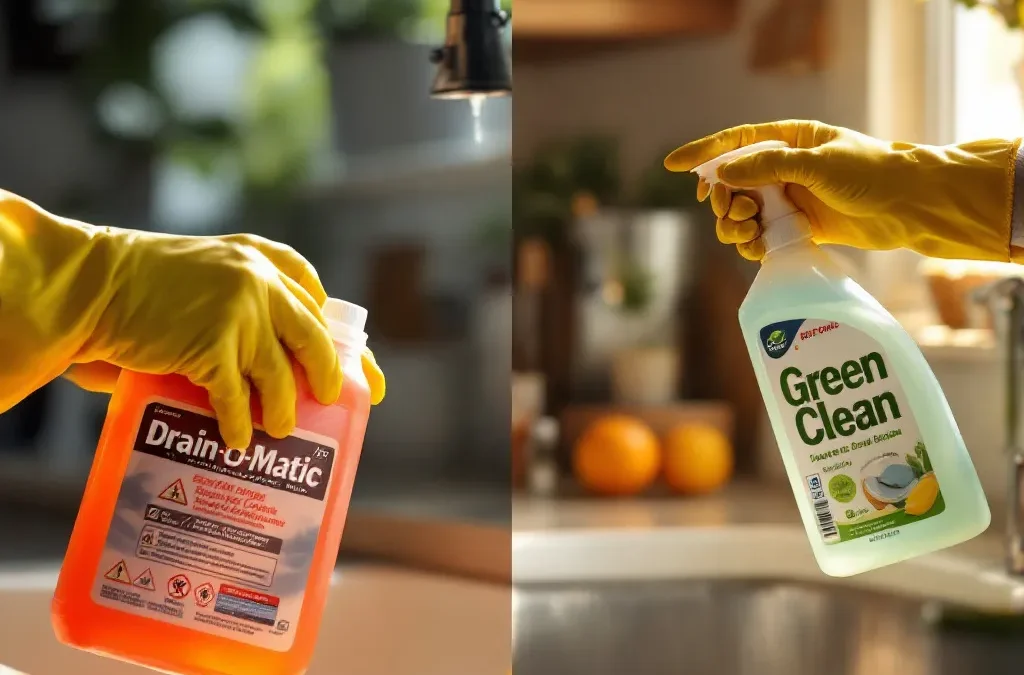I. Introduction
Proper drain cleaning is essential for maintaining a healthy home environment. Clogged drains can lead to unpleasant odors, backups, and costly plumbing repairs. This article explores the two main types of drain cleaners—chemical and enzyme cleaners—focusing on their safety and effectiveness.
II. Understanding Drain Cleaners
A. What are Chemical Drain Cleaners?
Chemical drain cleaners typically consist of harsh, caustic ingredients like sodium hydroxide or sulfuric acid. These compounds work by generating heat and breaking down organic materials that cause clogs in pipes. While they can be effective in clearing tough blockages, their potency also leads to significant safety concerns.
B. What are Enzyme Drain Cleaners?
Enzyme drain cleaners are composed of natural bacteria and enzymes that digest organic waste in plumbing systems. They function through a biological process, breaking down fats, oils, and other organic materials into simpler substances. This method not only clears clogs but also promotes a healthier plumbing environment over time.
III. Safety Concerns
A. Hazards of Chemical Drain Cleaners
Chemical drain cleaners pose various hazards, including toxicity to both humans and pets. Inhaling fumes or direct contact with these substances can lead to serious health issues, including respiratory problems and chemical burns. Furthermore, improper disposal can have adverse environmental effects, contaminating water sources and harming local ecosystems.
B. Safety Profile of Enzyme Drain Cleaners
In contrast, enzyme drain cleaners are generally non-toxic and biodegradable, making them a safer alternative for households. They pose minimal risks to humans, pets, and the environment. Additionally, enzyme cleaners are less likely to cause physical injuries, such as burns or reactions with other products.
IV. Effectiveness Comparison
A. Speed of Action: Chemical vs. Enzyme
Chemical drain cleaners are known for their rapid action, often clearing clogs in a matter of minutes. However, this quick result comes at a price. Enzyme drain cleaners can take longer to work, sometimes requiring several hours or even days to fully digest stubborn blockages.
B. Types of Clogs Better Suited for Each Cleaner
Chemical cleaners excel at cutting through tough clogs, particularly those caused by hair and soap buildup. On the other hand, enzyme cleaners are better suited for regular maintenance and breaking down organic waste that accumulates over time, preventing clogs before they form.
C. Long-term Benefits of Enzyme Cleaners vs. Immediate Results from Chemicals
While chemical cleaners provide immediate relief, their harsh ingredients can cause pipe damage over time, potentially leading to more costly repairs. Enzyme cleaners, although slower, promote the long-term health of plumbing systems by reducing buildup and maintaining smoother flow.
V. Cost Analysis
A. Price Comparison of Chemical and Enzyme Drain Cleaners
Typically, chemical drain cleaners are less expensive upfront than their enzyme counterparts. However, the potential damage they may cause to plumbing and the necessity for frequent use can increase overall costs. Enzyme cleaners may have a higher initial price but often provide better value in the long run through improved plumbing health.
B. Value of Preventive Maintenance with Enzyme Cleaners
Investing in enzyme drain cleaners as part of regular maintenance can save homeowners money in plumbing repairs and reduce the frequency of clogs. By breaking down waste before it accumulates, enzyme cleaners help maintain clear pipes and mitigate the need for more aggressive chemical options. Learn more about preventive drain cleaning here.
VI. Recommendations
A. When to Use Chemical Drain Cleaners
Chemical drain cleaners can be effective for severe blockages that require an immediate solution. However, caution is advised to prevent potential harm to pipes and the environment. Users should follow safety instructions strictly and consider fewer toxic alternatives when possible.
B. When to Prefer Enzyme Drain Cleaners
Enzyme drain cleaners are recommended for regular maintenance and minor clogs, promoting a healthy drainage system without harmful consequences. They are especially beneficial for households with children or pets, where safety is a primary concern.
C. Importance of Regular Maintenance and Preventive Options
Regardless of the chosen method, consistent maintenance is vital for preventing future clogs. Implementing back-to-back preventive measures, such as regular enzyme cleaner application, can lead to a healthier plumbing system and mitigate the need for future chemicals. You may also explore how to know when to call a plumber instead of DIY.
VII. Conclusion
In weighing safety and effectiveness, enzyme drain cleaners emerge as the safer choice for routine plumbing care. Their non-toxic profiles and preventive benefits make them suitable for various household needs. However, for immediate and serious clogs, chemical cleaners may still have their place when used responsibly.
If you’re ready to choose the right drain cleaning solution or need expert advice for your home’s drainage system, call us today at 916-562-2345 to get a quote. Our team is available to help you maintain a clean and healthy plumbing network.


